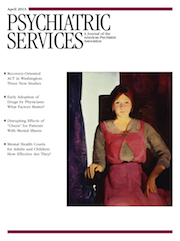The Mindfulness-Based Psychoeducation Program for Chinese Patients With Schizophrenia
Abstract
Objectives
This study tested the effectiveness of a mindfulness-based psychoeducation program for Chinese outpatients with schizophrenia over an 18-month follow-up. The program is a psychoeducational program that addresses patients’ awareness and knowledge of schizophrenia and builds skills for illness management.
Methods
A multisite controlled trial was conducted with 96 Chinese patients with schizophrenia in Hong Kong. They were randomly assigned to either the mindfulness-based psychoeducation program or usual psychiatric care. The patients’ mental and psychosocial functioning, insights into illness, and rehospitalization rates were measured at recruitment and at three and 18 months postintervention.
Results
Compared with those in usual care, the patients in the mindfulness psychoeducation program showed significantly greater improvements in their illness insights, symptom severity, functioning, and number and length of rehospitalizations at the 18-month follow-up.
Conclusions
The findings provide evidence that the mindfulness-based education program can improve Chinese schizophrenia sufferers’ psychosocial functioning and reduce their illness relapse.



